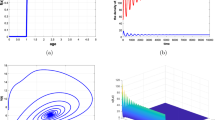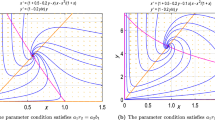Abstract
In this paper, we consider a diffusive Leslie–Gower predator–prey model with Bazykin functional response and zero Dirichlet boundary condition. We show the existence, multiplicity and uniqueness of positive solutions when parameters are in different regions. Results are proved by using bifurcation theory, fixed point index theory, energy estimate and asymptotical behavior analysis.
Similar content being viewed by others
References
Aziz-Alaoui M.A., Okiye M.D.: Boundedness and global stability for a predator–prey model with modified leslie-gower and holling-type II schemes. Appl. Math. Lett. 16(7), 1069–1075 (2003)
Bazykin A.D.: Nonlinear dynamics of interacting populations, vol. 11. World Scientific Pub Co Inc, Singapore (1998)
Blat J., Brown K.J.: Bifurcation of steady-state solutions in predator–prey and competition systems. Proc. R. Soc. Edinb. Sect. A 97, 21–34 (1984)
Camara B.I., Aziz-Alaoui M.A.: Dynamics of predator–prey model with diffusion. Dyn. Contin. Discret. Impuls. Syst. Ser. A 15, 897–906 (2008)
Camara B.I., Aziz-Alaoui M.A.: Turing and hopf patterns formation in a predator–prey model with leslie-gower-type functional response. Dyn. Contin. Discr. Impuls. Syst. 16, 479–488 (2009)
Cantrell, R.S., Cosner, C.: Spatial Ecology via Reaction-Diffusion Equations. Wiley Series in Mathematical and Computational Biology. Wiley, Chichester (2003)
Crandall M.G., Rabinowitz P.H.: Bifurcation from simple eigenvalues. J. Funct. Anal. 8, 321–340 (1971)
Dancer E.N.: On the indices of fixed points of mappings in cones and applications. J. Math. Anal. Appl. 91(1), 131–151 (1983)
Dancer E.N.: On positive solutions of some pairs of differential equations. Trans. Am. Math. Soc. 284(2), 729–743 (1984)
Gilbarg, D., Trudinger, N.S.: Elliptic partial differential equations of second order. Classics in Mathematics. Springer, Berlin, (2001, reprint of the 1998 edition)
Holling C.S.: Some characteristics of simple types of predation and parasitism. Can. Entomol. 91(7), 385–398 (1959)
Kamenskiĭ, M.: Measures of noncompactness and the perturbation theory of linear operators. Number. Vih. 430 (1977)
Leslie P.H., Gower J.C.: The properties of a stochastic model for the predator–prey type of interaction between two species. Biometrika 47(3/4), 219–234 (1960)
Li L.: Coexistence theorems of steady states for predator–prey interacting systems. Trans. Am. Math. Soc. 305(1), 143–166 (1988)
Neuhauser C.: Mathematical challenges in spatial ecology. Notices of the AMS 48(11), 1304–1314 (2001)
Peng R., Wang M.: On multiplicity and stability of positive solutions of a diffusive prey–predator model. J. Math. Anal. Appl. 316(1), 256–268 (2006)
Rabinowitz P.H.: Some global results for nonlinear eigenvalue problems. J. Funct. Anal. 7, 487–513 (1971)
Ruan W., Feng W.: On the fixed point index and multiple steady-state solutions of reaction-diffusion systems. Differ. Integr. Equ. 8(2), 371–391 (1995)
Shi J.: Persistence and bifurcation of degenerate solutions. J. Funct. Anal. 169(2), 494–531 (1999)
Shi J., Wang X.: On global bifurcation for quasilinear elliptic systems on bounded domains. J. Differ. Equ. 246(7), 2788–2812 (2009)
Tian Y., Weng P.: Stability analysis of diffusive predator–prey model with modified Leslie-Gower and holling-type ii schemes. Acta Applicandae Mathematicae 114, 173–192 (2011)
Wang M., Wu Q.: Positive solutions of a prey–predator model with predator saturation and competition. J. Math. Anal. Appl. 345(2), 708–718 (2008)
Wei M., Wu J., Guo G.: The effect of predator competition on positive solutions for a predator–prey model with diffusion. Nonlinear Anal. Theory Methods Appl. 75(13), 5053–5068 (2012)
Yamada, Y.: Positive solutions for Lotka-Volterra systems with cross-diffusion. In: Handbook of differential equations: stationary partial differential equations. Handbook of Differential Equations, vol. VI, pp. 411–501. Elsevier/North-Holland, Amsterdam, 2008
Zhou J.: Positive solutions of a diffusive predator–prey model with modified leslie–gower and holling-type ii schemes. J. Math. Anal. Appl. 389(2), 1380–1393 (2012)
Zhou, J., Shi J.: Multiplicity of positive solutions of a diffusive Leslie–Gower predator–prey model with Holling type II functional responses (2012, submitted)
Author information
Authors and Affiliations
Corresponding author
Additional information
Partially supported by NSFC grant 11201380, the Fundamental Research Funds for the Central Universities grant XDJK2012B007, Doctor Fund of Southwest University grant SWU111021 and Educational Fund of Southwest University grant 2010JY053.
Rights and permissions
About this article
Cite this article
Zhou, J. Positive solutions of a diffusive Leslie–Gower predator–prey model with Bazykin functional response. Z. Angew. Math. Phys. 65, 1–18 (2014). https://doi.org/10.1007/s00033-013-0315-3
Received:
Revised:
Published:
Issue Date:
DOI: https://doi.org/10.1007/s00033-013-0315-3




